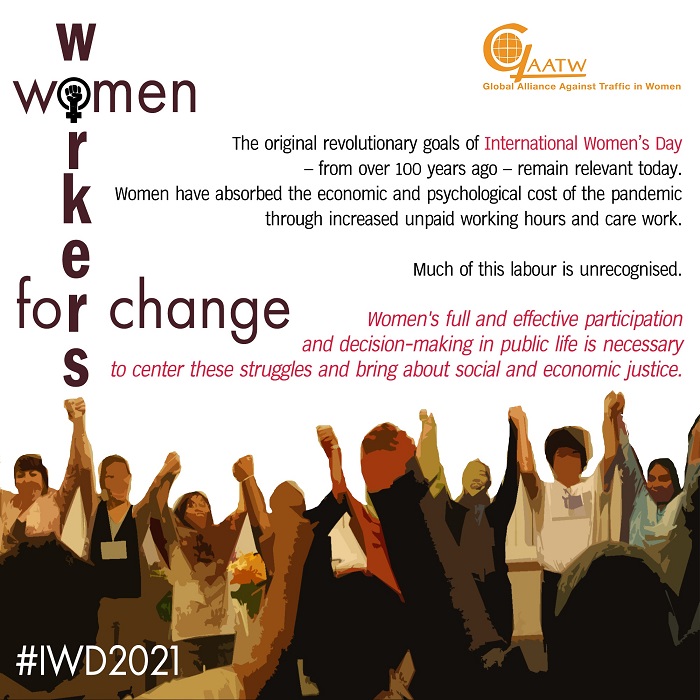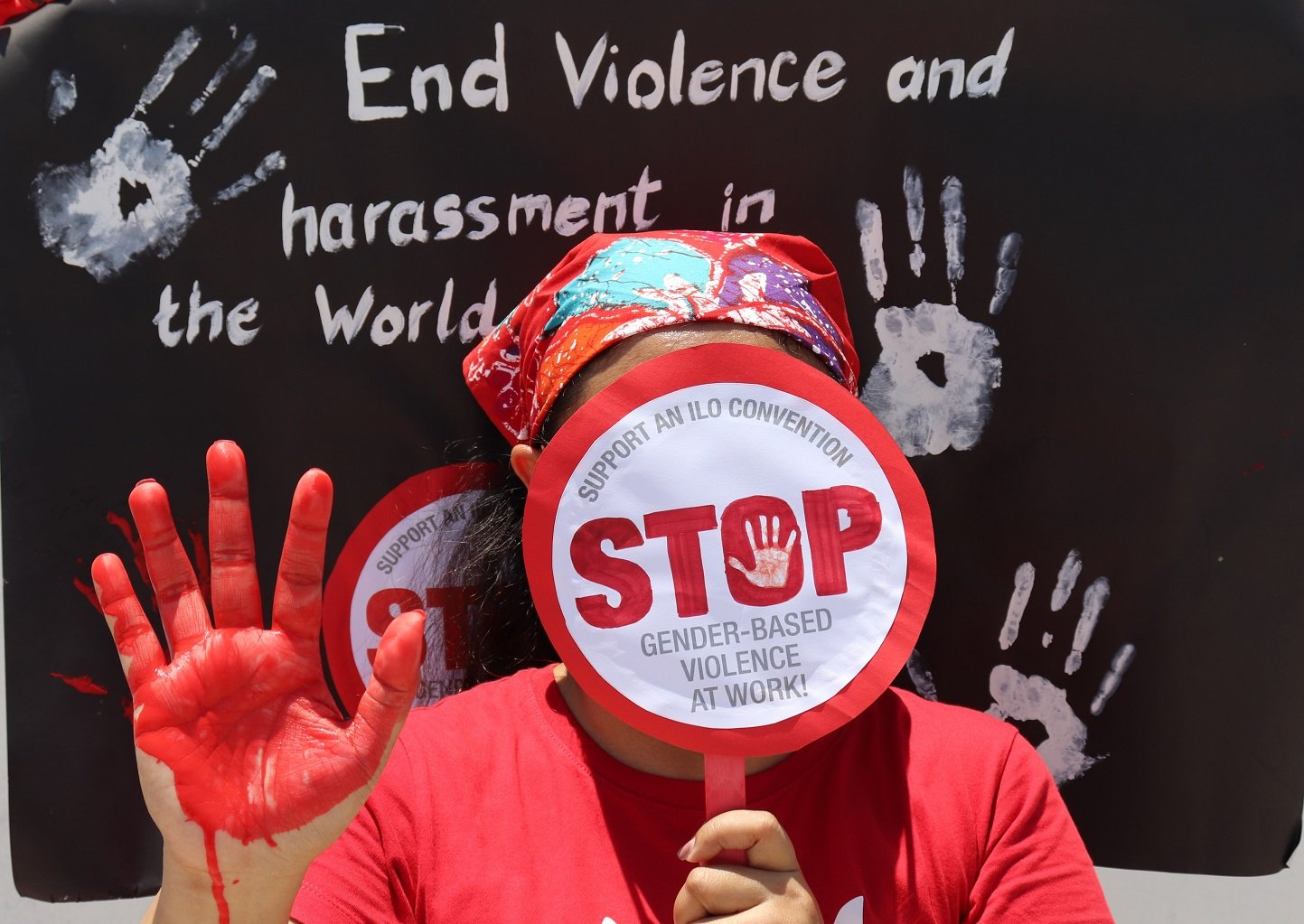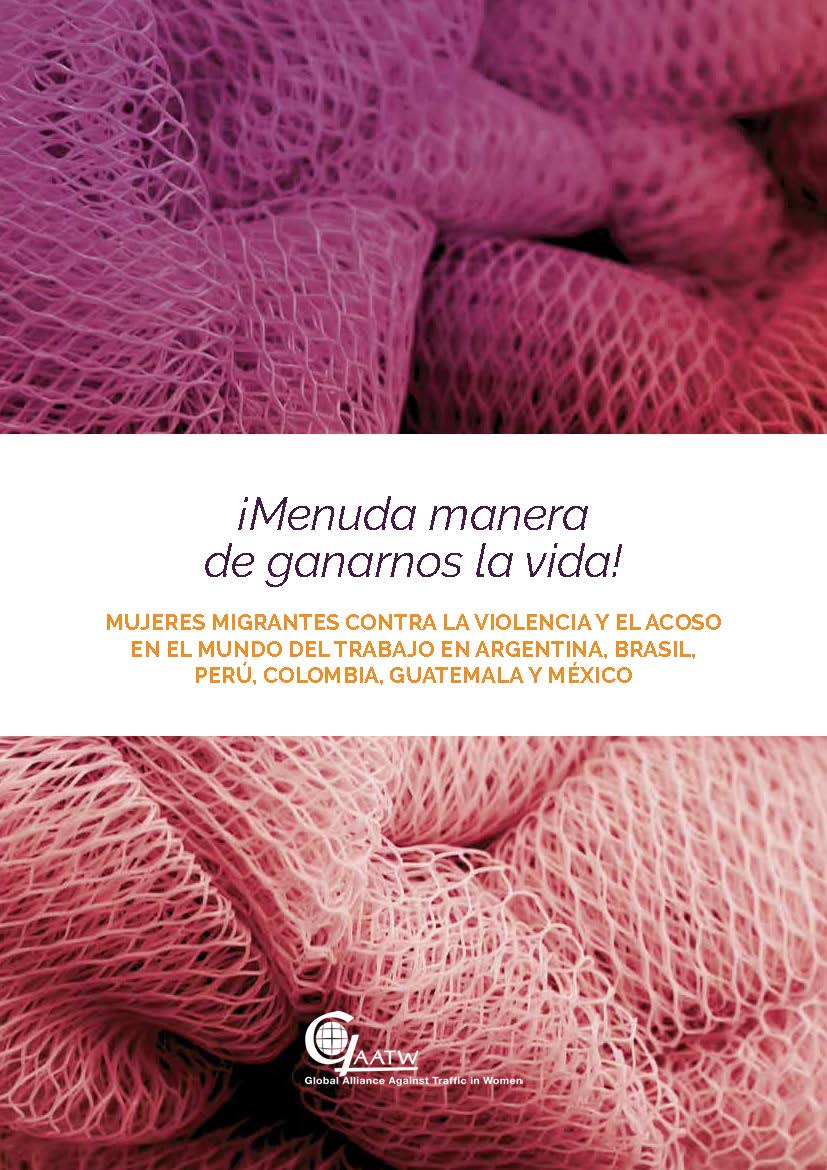A Woman's Place is in the Resistance

We are celebrating International Women’s Day in the midst of a deadly pandemic and major threats to human rights and freedom. For every one of these challenges, women have been at the forefront of the resistance.
From the ‘Wall of Moms’ in Portland, USA protesting against racial injustice and police brutality, to the ‘Women in White’ of Belarus demanding free and fair elections; from the demonstrations against the coup in Myanmar and for democratic reforms in Thailand to those to #EndSars in Nigeria; from the movements for a new constitution in Chile and for legal abortion in Argentina to those against the Citizenship Act and the Farmer’s Bill in India, women are showing that they will no longer put up with violence, injustice, oppression and despotism.
Global Call for Translators and Interpreters
Deadline: n/a. This is an ongoing call to roster
The International Secretariat of the Global Alliance Against Traffic in Women (GAATW-IS) is inviting translators and interpreters to roster their services for short term assignments.
1. About the Global Alliance Against Traffic in Women (GAATW)
The Global Alliance Against Traffic in Women (GAATW) is an Alliance of more than 80 non-governmental organisations from Africa, Asia, Europe, Latin America and North America. The Alliance promotes and defends the human rights of all migrants and their families against the background of an increasingly globalised labour market.
GAATW sees the phenomenon of human trafficking intrinsically embedded in the context of migration for the purpose of labour and calls for safety standards for migrant workers in the process of migration, and in the formal and informal work sectors - garment and food processing, agriculture and farming, domestic work, sex work - where slavery-like conditions and practices exist.
GAATW prioritises the value of experiential knowledge and the role that community-based organisations and women themselves can play in creating new knowledge about and fresh insights into issues affecting women’s lives, including migration and work. Such feminist knowledge is crucial in evaluating the effectiveness of existing labour migration regimes, and advocating for labour migration and anti-trafficking policies that protect the rights of women.
The COVID-19 Crisis is a Wake-up Call to Rethink the World of Work
Statement by the Global Alliance Against Traffic in Women on the occasion of International Workers' Day
This year we are celebrating International Workers’ Day in the midst of a global pandemic. A virus ten-thousandth of a millimetre in diameter has turned everyone’s lives upside down. At the time of writing, the novel corona virus or COVID-19, as it has come to be known, has claimed almost 230,000 lives and infected more than 3 million people. The number is still growing, healthcare systems are struggling to cope with the impact and an economic recession is just round the corner. The pandemic has rendered billions of people jobless, homeless and without food security. According to an ILO estimate, full or partial lockdown measures affect almost 2.7 billion workers, representing around 81 per cent of the world’s workforce.
As we grapple with the evolving situation, a few things are clear: this virus has exposed the stark inequalities in our societies and the abysmal scenario in the world of work. It is clear, if ever there was any doubt, that most governments have prioritised profit over people. It is perhaps not surprising that discrimination and structural violence towards care workers, migrants in low-paid jobs and workers in the informal economy are seen even in the COVID-19 containment measures. Indeed, the lingering images over the last several weeks are of the exodus of migrant workers from cities under lockdown, stranded workers huddled up in makeshift accommodations queuing up for food, workers harassed by law enforcement, women facing violence in their homes and farmers with their wasted harvest and unsold produce.
A Feast in Time of COVID-19: The anti-trafficking movement needs to take a step back
About two weeks ago, in mid-March, one of our colleagues received a message from a Thai journalist asking “Do you think that sex workers will be more vulnerable to trafficking now that the Thai government ordered all entertainment places shut?” In our office WhatsApp chat group, we joked “Well, this [linking COVID-19 to trafficking] didn’t take long”.
End Gender-Based Violence against Women Migrant workers
Statement by the Global Alliance Against Traffic in Women on International Women’s Day 2020

Women migrant workers experience a continuum of gender-based violence and harassment, ranging from insults to severe physical abuse, sexual assault, psychological abuse, bullying and intimidation.
This gender-based violence cannot be considered in isolation from the patriarchal stereotypes about women’s place in society, the value of their labour, and the violence that women are subjected to throughout their lives.
Violence and harassment faced by women migrant workers in Latin America
 Women migrant workers across Latin America endure extreme violence in order to be able to provide for their families, according to research carried out among workers in the garment, domestic, service, sex and hawking sectors.
Women migrant workers across Latin America endure extreme violence in order to be able to provide for their families, according to research carried out among workers in the garment, domestic, service, sex and hawking sectors.
Economic precarity was the driving factor for accepting poverty wages and poor working conditions:
- Workers in maquilas (garment factories) in Guatemala and Brazil work around 12 hours per day, locked in factories until production targets are reached, for as little as 200 US dollars a month.
- Some live-in domestic workers in Colombia work seven days a week, up to 15 hours a day, with salaries under minimum wages and in some cases with no salary at all.
All participants said that the constant economic instability and job insecurity in which they find themselves makes them accept conditions that in another context they would never have imagined enduring.
The research aimed to explore gender-based violence in the world of work from the perspective of women migrant workers. The 172 women interviewed by eight Latin American civil society organisations reported experiencing a spectrum of violence and discrimination, through dynamics created by patriarchal societies and families, racism and xenophobia and an entrenched neoliberal capitalist economy. This is creating a ‘new normal’ of permanent precarity through a lack of social coverage, poverty wages, exploitative working conditions and job insecurity.
Against the Grain: Fighting Corporate Agriculture through Women’s Solidarity
Leah Sullivan
Thirty years ago, the village of Pastapur was struggling. Dalit and Adivasi (indigenous) people who lived there did so in poverty, surviving from tiny plots of inhospitable land. Many more were landless agricultural labourers, eking out a living from neighboring farms. Hunger was a constant threat, and young people left for life in the city. Today, this has all changed.
“These days, other villages come to us for support”, we are told by village elder Chandramma, whose warm smile and quick wit easily overcome the language and cultural barriers otherwise between us. Over the last 30 years, small scale farmers in the area have developed an organic, biodiverse, and rain fed permaculture system, with support from the Deccan Development Society. The communities have gained their strength through the practice of sanghams (women’s community groups), where women collectively make decisions about agriculture and finance, share seeds, information about farming methods, ask for and offer help with weeding. As a consequence, the community is thriving. Landless families have managed to buy plots. Young people are staying or returning to the community, and no one goes hungry.
It’s a very different story from those that GAATW’s partners usually encounter among rural Dalit and Adivasi communities. Dalit and Adivasi women are disproportionately represented among India’s sizeable population of internal migrants, forming the backbone of sectors with some of the poorest pay and working conditions, such as domestic, garment and construction work. Many of these women have moved into this sector from a background as small scale farmers or landless agricultural labourers, forced into migration through the increasing unviability of their livelihoods.
Addressing Root Causes of Internal Migration in India – An inter-movement convening
 Sixty CSO activists, trade unionists and representatives of migrant rights, women’s rights, worker rights and Dalit and Adivasi rights groups across India met over three days in August 2019 to think collectively about how a cross-sectoral movement could address the systemic issues faced by women migrant workers in the country.
Sixty CSO activists, trade unionists and representatives of migrant rights, women’s rights, worker rights and Dalit and Adivasi rights groups across India met over three days in August 2019 to think collectively about how a cross-sectoral movement could address the systemic issues faced by women migrant workers in the country.
The meeting, co-organised by GAATW, SEWA[i] and MAKAAM[ii], looked holistically at the rights of women migrant workers by analysing the structural drivers of outmigration from the states of Odisha, Jharkhand and Chhattisgarh. These are states of origin for internal women migrant workers going into some of the sectors with the lowest pay and poorest working conditions, including domestic work, brick kiln work, garment work, construction work and sex work.
Our discussions drew a challenging overall picture for our movements in India today: a growing asymmetry of power between employers and workers, persistent patriarchal norms and attitudes, a political economy tilted in favour of the interests of big corporations over the rights of small-scale landowners and workers.
